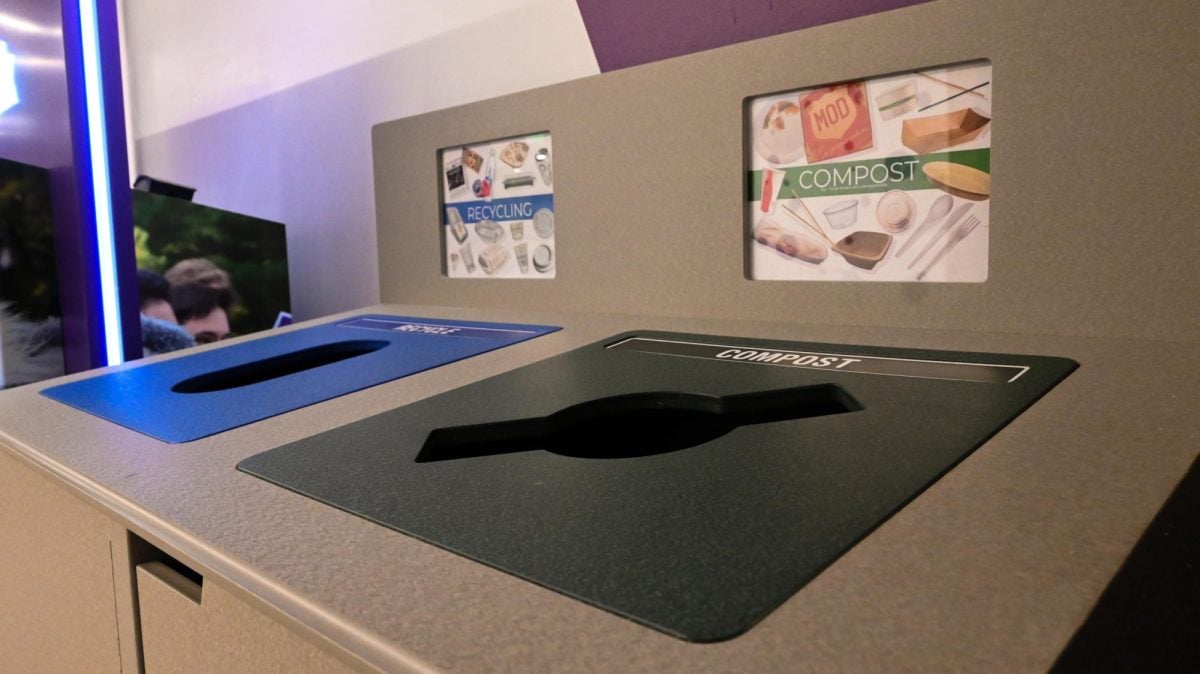After eating at Norris University Center, students are faced with three options for disposing of their waste: trash, recycle and compost.
The front-of-house composting program at NU started in October 2023, in part due to sustainability objectives set by Norris Executive Director Corbin Smyth.
When Smyth took on his position in June 2022, he aimed to incorporate sustainable ways for students to get rid of their trash.
“Our student population is more worldly, more educated, more excited about making a difference and doing the right thing,” Smyth said. “That’s the great thing about our student body. They’re more motivated.”
The composting program consists of initiatives throughout Norris to change how trash is disposed of.
SustainNU provided NU Dining with a list of approved compostable products, including flatware, plates, boxes, napkins and other dining utensils, as replacements for their disposable counterparts.
Trash bins with three sections were placed on every floor of Norris. The new units featured color-coded bins that indicate blue for recycling, green for composting and black for landfill items. Signs above each colored bin display images of commonly used food items in Norris and which bin they belong in.
The program expanded in September 2024 to replace disposable utensils with compostable ones for catered events.
Smyth said he received immense support from student groups on campus, such as Cats Who Compost and the Associated Student Government Sustainability Committee, who worked on educational campaigns to teach the NU community about composting and where to place their trash.
Cats Who Compost is a student group with the primary purpose of providing barrier-free composting to the general NU community, according to Quinn Correa, a Weinberg senior and the club’s president.
Correa said she believes composting has had a positive impact on the campus community because “you can’t go wrong with having it as an option.” She said students should care about composting because tons of waste comes out of NU.
“The country is slowly turning toward that methodology of zero-waste, sustainable food sourcing, sustainable waste initiatives, so it makes a lot of sense for Northwestern to try and get on that grind,” Correa said. “I think that’s generally why composting needs to be on people’s radars, but also to contribute to the overall sustainability of the school.”
Weinberg senior Kelly Teitel, former president of Cats who Compost, said she thinks the initiatives are a great way for students to get involved in sustainability efforts on campus.
Teitel said it has been exciting to see how many students are making an effort to compost in Norris and learn that the waste composting has already reduced. She said the metrics alone show how much of an impact composting has had.
“The general perception of Northwestern students from the Evanston community isn’t always the most positive, considering that we come in for four years, and we don’t necessarily get involved in the community as much as we should,” Teitel said. “I think this is a good way to demonstrate that we do want to work with them and are trying to mitigate the amount of waste that the Northwestern campus admits.”
Smyth said his hope for the future is to get to the point where 100% of items in Norris are compostable. Right now, as a part of the meal exchange plan, students receive a plastic water bottle with each meal. Smyth hopes to change that so students are still given water but in a way that’s more friendly to the environment.
The Starbucks inside Norris is one of the places Smyth said is a work in progress due to its adherence to corporate standards. However, he said they still utilize compostable drink trays and make straws available, but they are provided at the customer’s request rather than being given by default.
The goal is to eventually grow the composting initiatives in Norris to other buildings at NU, Smyth said. He hopes that one day, composting will become a norm among all students on campus.
“My joke with Kelly and Cats Who Compost is that my dream is for their organization to not exist at Northwestern, because it’s just so universal a group doesn’t have to advocate for it anymore,” Smyth said.
Email: [email protected]
Related Stories:
— NU Compost Fair fosters culture for campus food sustainability
— Students advocate for increased compost bin presence on campus
— ASG Sustainability Committee’s GREENOUT festival returns, promotes sustainability






